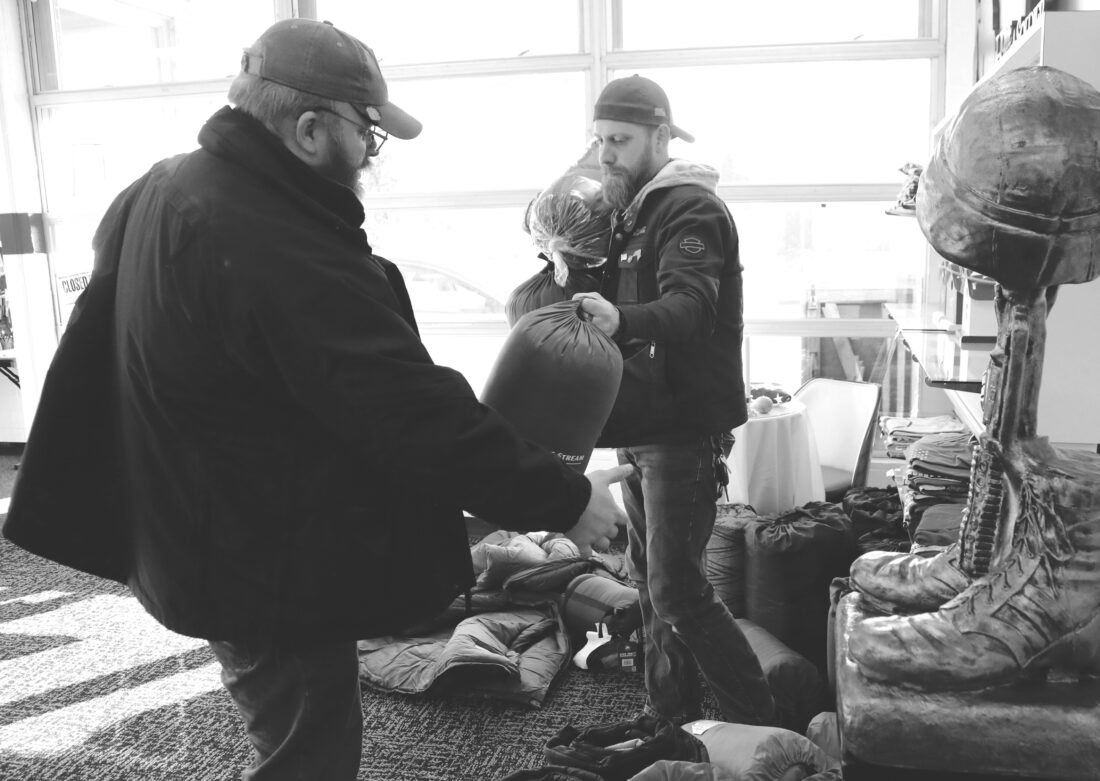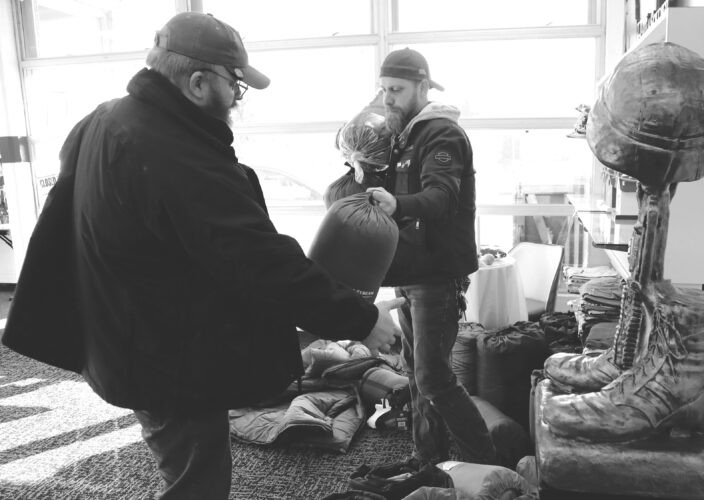Lansing plans pod city for homeless

Larry Mortimer, left, helps Tim Fitzgerald load sleeping bags for the homeless at the Bedford Township Veterans Center in Temperance, Mich., on Jan. 8, 2020. (AP file photo)
LANSING (AP) — As local governments across Michigan attempt to balance the growing need for homeless services with community concerns, one is planning a novel approach: mini housing pods.
The city of Lansing last month approved the purchase and storage of 50 modular housing units — called ModPods — for $640,000 from a Kalamazoo nonprofit that had given up plans to use them in that community.
It will cost local taxpayers another $750,000 a year to upkeep the mini homes, and they won’t be ready to use this winter when temperatures drop to levels that put people without homes at risk.
While some Kalamazoo residents had complained about the potential location of the housing pods, Lansing is taking its time to consider various city-owned locations. Advocates are hopeful it’s an approach that could help people, so long as officials are willing to engage prospective residents throughout the process.
“I think there’s utility in it. … It really depends on what the goal of the system is,” said Nick Cook, director of public policy for the Michigan Coalition Against Homelessness. “In and of itself, it’s just another tool in the tool bag for communities to deal with the homeless and unhoused populations.”
If successful, the approach would make Lansing the first city in Michigan to utilize the typically 8-by-8-foot housing units, which have been used in other parts of the country. They lock, can contain up to two beds, have limited storage space and will have hookups for heating, cooling and electric use once fully operational.
About 33,226 Michiganders experienced homelessness in 2023, the most recent year for which statewide data is available. That was an increase of about 2%, or 521 individuals from 2022 and an even larger jump from 2020, when the state reported 30,746 people experiencing homelessness.
Removing barriers
States across the country, including Nevada, Vermont and Oregon, have utilized modular pods for emergency shelter purposes, or as a means of transitional housing for people without homes.
Globally, the pods have also been used in countries like the United Kingdom, Germany and Japan in the last few decades.
In Burlington, Vermont, officials are pushing to continue their pod city for another three years, citing sustained demand for the structures. Residents living in the pod community have called living in the fixtures ” a positive experience.”
But housing advocates have questioned whether the city is doing enough to help people transition to long-term housing. The average length of stay has climbed to 240 days, up from 180 days when the pod city opened in 2023.
The Lansing pods were initially purchased for $1 million by Housing Resources Inc., a nonprofit that had planned to use them in Kalamazoo but struggled with land acquisition.
That shouldn’t be an issue in Lansing, where the local government is leading the charge, said Lansing City Council member Peter Spadafore. “If we located this on land owned by the city, that removes an incredible barrier,” he said.
While it’ll likely be some time before people can actually move into the pods, that “doesn’t mean we couldn’t go forward with some site improvement, like ground leveling, and things like that,” Spadafore told Bridge Michigan.
If all things go according to plan, it’s possible the structures will be ready for use by June 2026, said Lansing Human Relations and Community Services Director Kim Coleman.
Initial response from local residents has been mixed.
In an August meeting, some locals called the pods a good start in getting homeless individuals off the streets and into safe and clean living situations.
Others questioned the wisdom of spending nearly $1.4 million in the first year alone — the purchase cost, plus upkeep and maintenance — for 50 pods, when that money could go toward other housing needs.
___
This story was originally published by Bridge Michigan and distributed through a partnership with The Associated Press.



